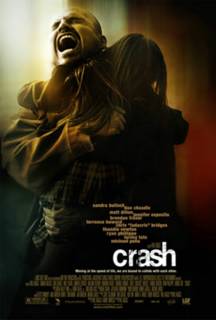
There are numerous episodes of violence in Crash, Paul Haggis’ gritty drama about race relations in multi-racial Los Angeles. From a slur of invectives to virtual sexual assaults, from latent racism to blatant racial distrust, from contained anguish to impulsive acts of aggression. Violence comes in any form.
But the movie is not all that. Crash is a clash of cultures – a crash of egos, frustrations, and frailties that come in everyday living in a city as divergent as LA.
First-time director Haggis, who also wrote Million Dollar Baby, has crafted the year’s first near-masterpiece. Filmed in the tradition of multi-character, fused story line and non-linear filmmaking recently seen in movies such as Amores Perros, Traffic, 21 Grams and Magnolia, Crash provides a fervid vision of society gone awry.
There are no black or white characters in this movie, literally and figuratively. Each has own imperfections. And each facet of humanity is evenly scrutinized, criticized that no character is left unturned. But however the film has depicted these characters, in the end they all come out human – flawed, deficient but all are capable of the universal feelings of hatred, fear and affection, relative or otherwise.
With Haggis’ able direction, the film cruises through a day in the life of several Angelenos as they grapple over life’s basic inequity; directing their frustrations toward people who are culturally, racially different from them. Ranging from misunderstood biases to unsubtle prejudices, these series of vignettes commences in sudden bursts of violence and culminates in a harried play of startling tragedy and inadvertent comedy.
On top of the directing and writing triumphs, Crash is further enhanced by the extraordinary performances of the ensemble cast. Among them, Terrence Howard, Larenz Tate and Matt Dillon give the most memorable turns.
Howard plays a black TV producer who turns a blind eye to lurking racism in his midst. Until he experiences this first-hand and sees his wife virtually assaulted by a cop does he confront this undeniable truth, but what does a black man of his position do? We are given clues, but no direct answer. But his performance signals the coming of another brilliant actor.
Tate plays a nerdy hoodlum who listens to Country music, views his surroundings pragmatically and leads a life on the edge. Whatever awaits his character’s fate, it however sets the stage to unravel another unsettling truth. This truth provokes the viewer to assess his own perceptions about various shades of racial discrimination.
Dillon plays a cop, the symbolic LAPD of recent years. Here he plays a cop whose routine means of apprehending people is sullied by his sinister and racist expressions. We are given tentative glances of his innate goodness but is only ironically summoned in a climactic incident. Dillon’s performance has the toughness and tenderness that leaves the most memorable impression to the viewer.
Notwithstanding the disappointing final frame that closes the movie, Crash remains a cinematic triumph, a scathing thesis on social disharmony. It’s a must-see!





No comments:
Post a Comment